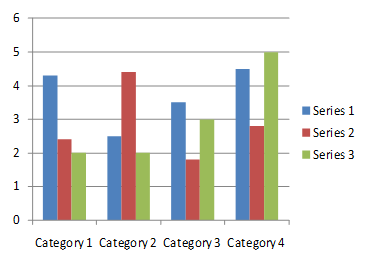Monday, July 16, 2012
Even though I couldn't find anything yet, I have been getting some responses to the emails and applications I sent. Therefore, I decided to update my photography portfolio page with some of my latest photography work to showcase my photography and photo editing skills
Since the competition is very high in this field, I know, it won't be an easy task for me to find a job as a photographer in Chicago. Anyway, I believe this will give me a strong base for my job search.
Chathura Jayasinghe Photography
Wednesday, February 29, 2012
PowerPoint 2007 Chart Templates
1. Creating and Saving Templates
- In PowerPoint, go to "Insert" ribbon and click on "Chart" button under "Illustrations" group.
- Select preferred chart type an d click "OK." I have used a clustered column chart for this illustration.
- You will get a chart like this with the default colors of your current template. Apply the formatting that you prefer. Below is my sample chart after formatting:
- Now that you're done with formatting the chart, it's time to save the chart as a template. To do so you need to:
- Click on the chart, go to "Design" ribbon under "Chart Tools," click on "Save As Template" button in the "Type" group.
- In the "Save Chart Template" dialog box, choose a name and click "Save." Make sure to keep the ".crtx." file extension. The chart template will be saved in:
- Windows Vista/7:
"C:\Users\Username\AppData\Roaming\Microsoft\Templates\Charts\" - Windows XP:
"C:\Documents and Settings\Username\Application Data\Microsoft\Templates\Charts\"
You will need to replace "username" with your username. - Windows Vista/7:


2. Using Chart Templates
- To insert a chart from the template that you just created, go to "Insert" ribbon and click on "Chart" button under "Illustrations" group.
- Then click on the "Templates" menu item from the left panel.
- Here you can see the chart template that you created appears on the write panel. Double-click on the template icon to insert the chart.

3. Installing Custom Chart Templates on a Different Computer
- To install chart templates onto another PC, go to the following folder in your computer, depending on your operating system:
- Windows Vista/7:
"C:\Users\Username\AppData\Roaming\Microsoft\Templates\" - Windows XP:
"C:\Documents and Settings\Username\Application Data\Microsoft\Templates\"
- Windows Vista/7:
- Copy the "Charts" folder that you find into a portable drive (E.g., USB thumb drive).
- On the other computer, go to the same folder path mentioned above depending on your operating system and paste the "Charts" folder there.
- To insert a custom chart template in PowerPoint, follow step 2.
If you have any question or recommendation, please leave a comment.
Tuesday, January 17, 2012
What is SOPA?
To figure out that, I Googled and found this interesting article. I'm sharing this for knowledge of everyone who follows my blog.
What is SOPA?
SOPA stands for the Stop Online Piracy Act. It is one of two bills being considered by congress today. The other is the Protect-IP Act.
They are well-intentioned. They want to prevent piracy and copyright infringement. But they do so in an overly-aggressive, innovation-endangering way. They allow the entertainment industry to censor sites they feel "engage in, enable or facilitate" infringement.
The issues with SOPA:
The Electronic Frontier Foundation describes SOPA as the "blacklist bill" because it would "allow the U.S. government and private corporations to create a blacklist of censored websites, and cut many more off from their ad networks and payment providers."
That means the Attorney General would have the power to cut off select websites from search engines like Google. It could also cut off advertisers and payment processors like Visa from the sites. The Attorney General could essentially kill all of a site's traffic and revenue in a matter of days.
SOPA only allows targeted sites five days to submit an appeal. That doesn't leave much time for them to defend themselves before losing their site and their revenue altogether.
What tech companies and innovators are saying about SOPA:
The heavy regulation SOPA implies isn't sitting well with many of tech's best and brightest. People from AOL, Twitter, Google, LinkedIn, Zynga, and Facebook have all signed a letter to congress that opposes SOPA. The letter states:
"Since their enactment in 1998, the DMCA’s safe harbor provisions for online service providers have been a cornerstone of the U.S. Internet and technology industry’s growth and success. While we work together to find additional ways to target foreign 'rogue sites,' we should not jeopardize a foundational structure that has worked for content owners and Internet companies alike and provides certainty to innovators with new ideas for how people create, find, discuss and share information lawfully online.”
What is American Censorship Day?
The reason you're reading about SOPA so much is because congress is reviewing both acts today. As such, EFF, Public Knowledge, Free Software Foundation and Demand Progress have named today American Censorship Day. They're encouraging people all over the web to fight for "Internet freedom."
Source: "This Is SOPA, The Crazy Bill Everyone In Tech Is Worried About," businessinsider.com, January 18, 2011.

